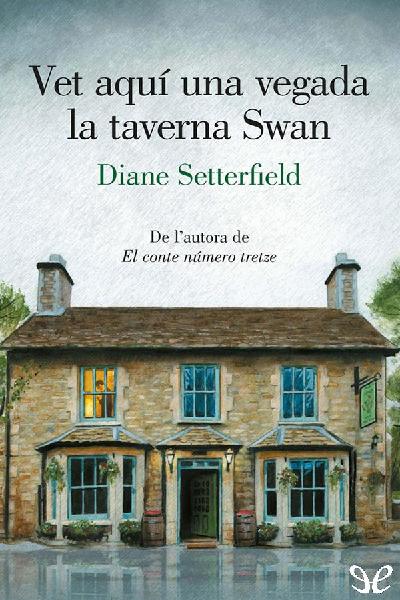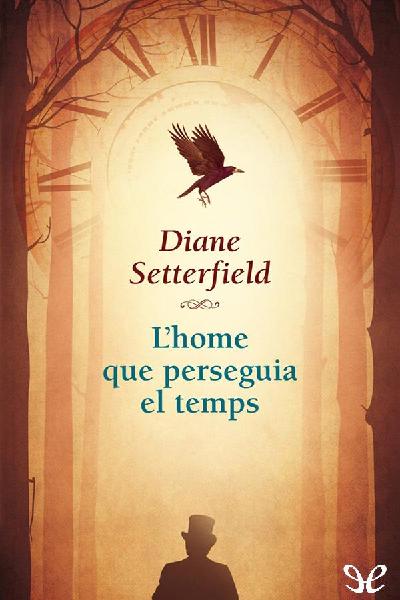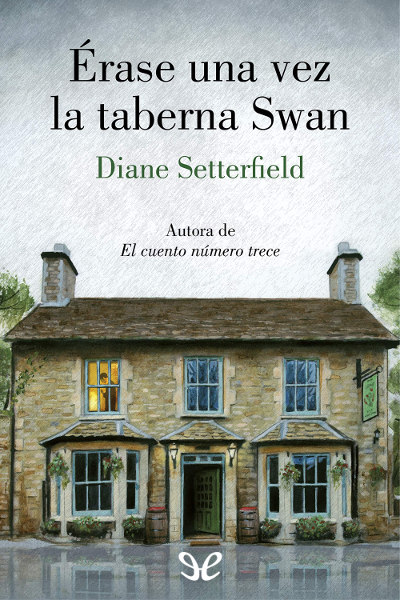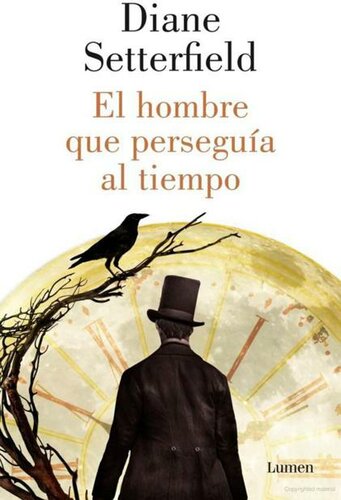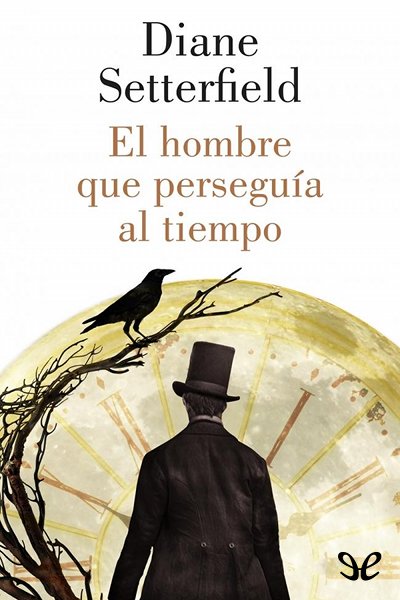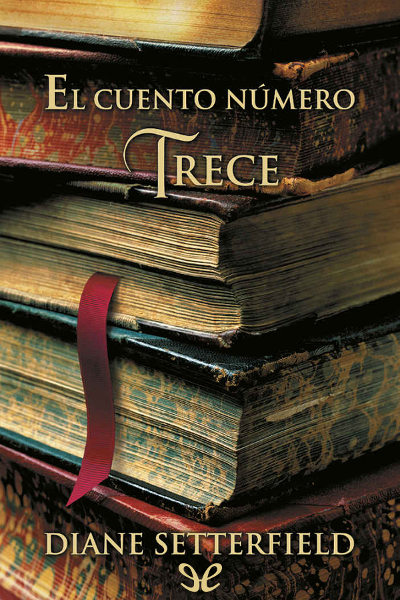oleebook.com
El cuento numero trece de Diane Setterfield
de Diane Setterfield - Género: Ficcion
Sinopsis
Diane, Setterfield Year: 2009
Libros Recomendados - Relacionados
Comentarios de lectores del libro El cuento numero trece
¡Me gustó muchísimo! Estaba en un momento en el que necesitaba abstraerme de todo, y con este libro lo conseguí. Me absorbió y me duró poco; disfruté mucho con él.Tengo claro que pronto leeré otro libro libro de esta autora.Perfectamente lo recomendaría e incluso lo reelería.
Autor del comentario: MELI_GM
=================================
Autor del comentario: MELI_GM
=================================
Libro muy especial, cayó en mis manos por casualidad y aunque no estaba muy convencida de leerlo, he de decir que me sorprendió muchísimo. Una historia que se remonta años atrás, con un final algo inesperado.
Autor del comentario: CARLASAN
=================================
Autor del comentario: CARLASAN
=================================
Me sorprenden las altas notas que para los lectores merece este libro. A mí particularmente me ha parecido un tostón, en el que finalmente pasaba por las hojas escaneándolas por si encontraba algo interesante. No lo recomiendo en absoluto.
Autor del comentario: JUANACAS
=================================
Autor del comentario: JUANACAS
=================================
Un libro bastante normalito que se deja leer pero sin más. Encuentro que podría haber sido bastante mejor porque la historia es bastante buena pero quizá la autora no le saca todo el jugo.
Autor del comentario: JOSE978
=================================
Autor del comentario: JOSE978
=================================
Mantiene un aura de misterio y se hace muy interesante. Me gustó , pero el final más que sorprendente me pareció enrevesado y poco creíble. A pesar de todo, tiene buenos momentos y una vez que empieces no podrás dejarlo.
Autor del comentario: PLEISTOCENO
=================================
Autor del comentario: PLEISTOCENO
=================================
Quizás un poco enrevesado y lioso, particularmente se me mezclan algunos personajes y cuesta sacar el final de la historia y quizás los últimos libros que he leído son muchísimo mejores que este y también se nota.
Autor del comentario: DELUCIO111
=================================
Autor del comentario: DELUCIO111
=================================
Emocionante, intrigante y emotiva, El Cuento Número Trece es una maravillosa novela, que guste o no, no deja a nadie indiferente.Está bien escrita y mejor desarrollada, y aunque algo enrevesada, consigue mantener el ritmo narrativo a lo largo de toda la historia. El argumento, muy simple en apariencia, se va enmarañando hasta tal punto que no puedes dejar de leer, para conocer la historia que cuenta la señorita Winter. Pero entre medias de esa historia, la autora nos descubre otra, la de Margaret Lea, la narradora y (supuesta) escritora del libro, que tiene partes apasionantes y misteriosas.El final me ha decepcionado por lo convencional y simple que es. También es cierto, que si lees de forma atenta el libro, puedes vislumbrar en que consiste el secreto, que dicho sea de paso, se descubre muy pronto para mi gusto. Y sin embargo, no te deja la impresión de ser previsible.En resumen, estamos ante un gran libro, bellamente escrito, intrigante y con una historia compleja y apasionante, que no podrás parar de leer. Puede que tenga momentos más densos, pero recupera rápidamente el ritmo y deja tan buen sabor de boca, que cuesta desengancharse de él, dejándote con una sensación nostálgica. Es, en definitiva, un buen libro.
Autor del comentario: REAH_29
=================================
Autor del comentario: REAH_29
=================================
Empieza algo lenta pero en cuanto empieza a narrar la historia Vida Winter se vuelve muy amena e intrigante. Fácil de leer y muy entretenida.
Autor del comentario: APOLO
=================================
Autor del comentario: APOLO
=================================
Claramente de más a menos, y al final deseando terminarlo. No terminó de engancharme y por el argumento me parece que la autora podía haberle sacado más partido.
Autor del comentario: PAKOKO
=================================
Autor del comentario: PAKOKO
=================================
Novela entretenida que se lee fácilmente, en algunos capítulos debo decir que me aburrieron sobre todo los que narran la vida de la biógrafa. No te arrepentirás de su lectura pero tampoco quedará en tu memoria, ni será uno de los libros de tu vida.
Autor del comentario: DEPUCELA
=================================
Autor del comentario: DEPUCELA
=================================
Una novela de la que me enamoré. No hay mucho más que explicar, poco a poco te vas metiendo en la historia, te atrapa y quieres saber más. Si lo piensas, la trama parece la de una película mala de domingo por la tarde, de hecho creo que han hecho la película, pero como novela, esta contada de manera magnífica bajo mi opinión.
Autor del comentario: CAPITAN_RAVEN
=================================
Autor del comentario: CAPITAN_RAVEN
=================================
Una lectura apasionante, aunque predecible, mantiene tensión hasta el final. Los personajes son bastante bien representados y ambientados.
Autor del comentario: SANESTEBAN
=================================
Autor del comentario: SANESTEBAN
=================================
Principalmente es una historia de misterio, bien narrada y con un aire adictivo a "novela victoriana". Pese a que no es un libro corto, su lectura se hace amena, aunque no le pongo más nota porque en algunos momentos, la trama se ralentiza un poco. El final es emotivo -lo justo-, y podría haber sido más memorable retrasando un poco la explicación del "misterio central" y añadiendo a la protagonista un conflicto de mayor envergadura.Lo mejor: el misterio central entorno a las dos gemelas, las alusiones (especialmente al principio del libro) al mundo de las historias y los escritores.
Autor del comentario: THATFOREST
=================================
Autor del comentario: THATFOREST
=================================
Muy bueno, muy bien escrito. Adictivo y nada esperable
Autor del comentario: SONIA049
=================================
Autor del comentario: SONIA049
=================================
Libro pasable. Cumple lo que promete pero poco más. No es una historia que cautive ni nada parecido, pero no está mal tampoco.
Autor del comentario: JAIMEHAZ
=================================
Autor del comentario: JAIMEHAZ
=================================
Reseñas Varias sobre este libro
Sigh. I really, really wanted to this book. I heard good things about it, and it has many elements I usually love in a novel: a Victorian sensibility, questions of identity and sisterhood (as well as siblinghood generally), meta-commentary on writing, and a plain, quiet, somewhat chilly protagonist who prefers books to people. The protagonist, Margaret, grew up in a bookstore and learned to read using 19th century novels, and there are clear parallels in the story to Jane Eyre, Wuthering Heights, The Turn of the Screw, and so on.
And yet, with all it had going for it, somehow it fell flat for me. Somehow it felt slight and, eventually, tedious at the same time. There were definitely many interesting moments, but for some reason, the "gothic" elements of the story never swept me up in the passion and scandal the way it would if the Brontes or Wilkie Collins wrote it. Obviously this is an unfair comparison since the Brontes and Collins are my favorite writers, but then again, if you're going to model your story on Jane Eyre (and indeed, there were parts that really beat you over the head with it, stating the obvious instead of allowing the reader to infer for herself), you should be up to the task, right? One of the problems, in my opinion, is that it seems Setterfield wanted a "Chinese box" construction ala Wuthering Heights, but whereas that novel drew me in and made me feel I was personally sitting at Nelly's feet as she told me the story of Heathcliff and Cathy, somehow Setterfield's construction (in which the novelist Vida Winter tells Margaret her story, and does so using third person, for a reason revealed later in the novel) feels very distanced. Margaret has a personal obsession which is supposed to parallel Miss (the novel's term, not mine) Winter's, but this obsession, for me at least, had me wishing Margaret would just get over it already. Miss Winter's story stops adding much new information at a certain point, and later we are given the diaries of a minor character, which essentially only goes over information we already know. Yet despite this, the ending feels rushed, and the mysterious "thirteenth tale," which Margaret receives in writing toward the end, is only excerpted. One wishes A.S. Byatt had written this novel, as I suspect Setterfield may not have felt up to the task of writing "the thirteenth tale," which has a fascinating premise. Byatt, I am sure, would have written a gorgeous tale to end the book with.
That's the bottom line, I suppose: I just don't think Setterfield is that good a stylist. The story should have drawn me in but didn't, and I set it down to writing that simply wasn't as imaginative or lovely as it could have been. If I read that someone made "hot, sweet tea" ONE MORE TIME I was going to go crazy -- I hot, sweet tea as much as the next Victorianist, but can't you find something else to describe, or a different way of doing it?
With all of the wonderful Victorian-style writing going on now from former academics Sarah Waters and AS Byatt, it's too bad this book didn't measure up. I kept comparing it to the (in my opinion) wonderful The Historian by Elizabeth Kostova, which is also a first novel by a former academic. The Historian has faults -- it's a little repetitious in certain points, it's unwieldly, there are some logic issues -- but it is so true to its Victorian predecessor (Bram Stoker's Dracula) in feeling, and it completely sucks you in (pun intended). I have discovered a personal preference: I would rather have an overlong, unweildy, messy wonderful novel that completely absorbs me than a shorter, tidier, but slight novel that doesn't touch me emotionally. Wow, did I just write a review that's longer than the book I just read?neo-victorian675 s Emily May2,058 312k
There is something about words. In expert hands, manipulated deftly, they take you prisoner. Wind themselves around your limbs spider silk, and when you are so enthralled you cannot move, they pierce your skin, enter your blood, numb your thoughts. Inside you they work their magic.
I don't know if I've ever loved words so much.
Lots of people told me that this was a book I needed to read, but many of those people also warned me that I might find it slow. So I went into The Thirteenth Tale prepared for a subtle plot that moved at a gentle pace... well maybe my expectations are to blame but that wasn't what I got. Slow?? Not for me. There was not a slow moment in this story because the prose itself was dynamic and consumingly evocative. I was intrigued by the mystery, seduced by the characters and caught up in page after page of well-written family drama.
Do you ...?:
1) Books
2) Mysteries
3) Family dramas
If you said yes to those, then I really can't see any reason you wouldn't love this book. People were right when they said it's a book for people who love books. It is. A love of literature and words is enthused in every page of this novel. I find myself believing that had I not already been a bibliophile, an encounter with this book would be enough to have me drooling over the endless possibilities and magic that lie within stories.
I must confess that I am almost always a story person first, a character person at a close second and a language/word person last. This book delivered on all three, but it was the latter that most amazed me. Setterfield completely seduces you with words. I read passages over and over again because I loved the language and style so much.
Books are, for me, it must be said, the most important thing; what I cannot forget is that there was a time when they were at once more banal and more essential than that. When I was a child, books were everything. And so there is in me, always, a nostalgic yearning for the lost pleasure of books. It is not a yearning that one ever expects to be fulfilled.
The story is about a biographer called Margaret Lea who very suddenly and unexpectedly receives a hand-written letter from the popular and critically-acclaimed novelist - Vida Winters. Ms Winters wants Margaret to recount her life story, she wants to finally stop telling fictional stories and reveal the truth of her childhood and all its dark secrets. Before accepting, Margaret reads and falls in love with one of the author's books called Thirteen Tales of Change and Desperation, but she is surprised to find that it contains only twelve stories... where is the thirteenth tale?
Margaret finds herself unable to refuse the job. And as Vida Winters opens up more and more, both women are forced to confront the demons of their pasts.
I, for one, was totally sucked into every aspect of the story. The writing had hold of me, the characters made me need to know more about their lives, the mysteries surrounding Winters' youth kept me guessing. If it's possible, I think this book made me love books even more.
Blog | Leafmarks | Facebook | Twitter | Instagram | Tumblr2014 mystery-thriller623 s Lisa Muller37 30
"Do you know the feeling when you start reading a new book before the membrane of the last one has had time to close behind you? You leave the previous book with ideas and themescharacters evencaught in the fibers of your clothes, and when you open the new book, they are still with you"
This quote from The Thirteenth Tale by Diane Setterfield sums up my experience with the book. Its been a while since Ive felt truly drawn in to a novel. ly this is the result of my recent tendency toward selecting less-than-literary books in an attempt to find some distraction without devoting much real focus to the reading. Ill admit that it took me a bit to get hooked, but, a few chapters in, I found myself thinking about the novel and the developing plot at times when I was unable to be reading.
There is no reference to time in the setting of The Thirteenth Tale. From the context clues, Id guess that its set in the 1970s. Its a world where people still write letters and where if phone lines go down in a storm, country homes are cut off from contact with civilization. Manuscripts are written by hand. The feel of the book is reminiscent of Jane Eyre, a novel that itself is woven throughout the plot.
The story begins when Margaret Lea, a little-published biographer, is summoned by Vida Winter, famous novelist. Ms. Winter is finally ready to tell her true life story, rather than another of the many versions shes given of her life over the years. As she does so, Margaret and the reader are drawn into the mystery that shrouds Ms. Winter. Through the stories she tells Margaret as well as the accounts of Margarets own investigations, we eventually learn the truth both about Ms Winter and the legendary Thirteenth Tale, a story that was left out of an early collection written by Ms. Winter. There are enough twists to keep the story interesting and unpredictable.
The book jacket describes The Thirteenth Tale by stating,
"It is a tale of Gothic strangeness, featuring the Angelfield family, including the beautiful and willful Isabelle, the feral twins Adeline and Emmeline, a ghost, a governess, a topiary garden, and a devastating fire."
In reality, its that and much more. This book lead me to wonder about identity, love, and the meaning of family. I have a feeling these characters will indeed be in the fiber of my clothes for quite some time.
334 s jessica2,575 43.4k
this book has been sitting on my TBR for yearsss. its one of those books that sounds interesting and i want to read it, but i have never been in the mood to actually pick it up. until now, when i finally forced myself to read it.
and boy, i had NO idea i was going to get a gothic ghost story. the format is very the seven husbands of evelyn hugo, but instead of hollywood, its victorian jane eyre. it was a complete surprise how kind of spooky this story is. i really dont want to say much because, honestly, i would recommend readers go into this blind to get the full effect.
but just know this is a story about twins, an old manor house, and all of the secrets held within.
? 4 stars257 s Adina ( away for a few more days)1,048 4,296
Read 2015. Proof read 2023.
Ive wanted to read this novel for a long time. I found it on a Goodreads list of books about books and, after reading the description, I thought this is a perfect book for me. And it was, almost.
It is a book for people who books, mysteries and family dramas. Also, it is for people who enjoy Victorian literature ( I cannot call myself a fan as I did not read enough books from that period something I try to fix). It also has some Gothic flavors.
I picked this up with a lot of anticipation and I loved the beginning. I also enjoyed the atmosphere of the book, the twists and turns and all the love declarations for books. It praises Jane Eyre, Weathering Heights, The woman in White and I believe the novel borrows elements from all the above mentined classics.
Although I really enjoyed the book, I wasn't completely sold by the ending. I do not know the reason for this. I do not know what I expected but somehow it was not this ending. It felt a little bit too abrupt, maybe. I do not know.
Also, the main character has a personal torment that feels a little bit exaggerated. However, I am not in her place so I wouldn't know how I would react.
As I am quite harsh with my stars and only give 5 stars to my favorite books I will give this one 4. Maybe Ill change my mind. Saying that, I still recommend it to all book lovers out there. I think it will be enjoyed by readers that d Shadow of the Wind.book-club historical-mistery mystery243 s6 comments Nicole621 15.5k
Ksi??ka zawiera spojlery do "Dziwnych losów Jane Eyre"
Absolutnie przecudowna, o sile krwi, wi?zach, osnuta atmosfer? mg?y.
To w?a?nie mi?o??.221 s Jessica ? ? Silverbow ? ? 1,279 8,847
Reviewed by: Rabid Reads
So here's my problem with gothic literature: it's so habitually grotesque that it's predictable.
If there's not incest, there's a crazy wife in the attic. If there's not a crazy wife in the attic, there's a murderous illegitimate son who's not right in the head. Or conjoined twins. Or a dying gypsy's curse. Or something equally unsettling.
So even if you guess the HEP Big Secret wrong, whatever it actually is isn't going to make a dent. B/c you've already imagined the worst. B/c gothic.
ALSO . . . I don't it.
If I lived in the time of traveling freak shows, I would not attend. Not my bag.
You: So why did you read it?
Me: B/c didn't realize it was gothic until I'd already started it.
You: Why didn't you quit?
Me: SCHADENFREUDE . #thestruggleisreal
Plus, the concept is friggin amazing: England's most beloved author, who's written 56 novels in 56 years, has zealously guarded her privacy. She made her pen name her legal name, and has threatened any would-be biographers with lawsuits until they backed down.
Interviewing her has become a kind of rite of passage for journalists, b/c she gives a different version of her life story to every, single one of them. <------how cool is that?
But now she's dying, so she contacts our MC (Margaret), an amateur biographer who's grown up in her father's rare bookshop (a bibliophile's DREAM), and employs Margaret to write her life story before she leaves this mortal coil.
After that is when it gets weird. And gross. And creepy. And messed-the-eff-up.
Man alive, these people are CRAZY.
Including Margaret, who has an unhealthy fixation on her dead-shortly-after-birth twin sister.
Genre preferences aside, there's no denying that this is a beautifully written book:
There is something about words. In expert hands, manipulated deftly, they take you prisoner. Wind themselves around your limbs spider silk, and when you are so enthralled you cannot move, they pierce your skin, enter your blood, numb your thoughts. Inside you they work their magic.
It's also mindbendingly clever.
The line between mental illness and the supernatural is so thin, so frail, so indecipherable, that even now, days later, I can't stop thinking about it--were the ghosts real, or did they only exist in her mind?
I. DON'T. KNOW. *EDVARD MUNCH FACE*
THE THIRTEENTH TALE by Diane Setterfield is not a book you read then forget. It stays with you, taking up brain space, whispering incessantly, the five notes of a song you can't place, but can't escape. It's beautiful and terrible. And even if you avoid gothic novels I do, this one . . . This one deserves to be made an exception. Highly recommended (with trepidation).
fantasy historical-fiction magical-realism ...more216 s Navessa449 30
"Tell me the truth."
These are the words that a young journalist speaks to Vida Winter in the beginning of this book. Vida is an author famous for spinning magical tales. In books, and about her life. Each time she releases a new story, she grants multiple interviews, in which every journalist asks her the story of her life, and leaves thinking that they, finally, after decades of deceptions, are the one she's told the truth to.
But she never does. Until now.
Out of the blue, she writes to an amateur biographer named Margaret Lea, telling her that she has chosen her to be her official biographer. That she is finally ready to tell the truth.
What follows is something I find myself at a loss to describe. Setterfield's prose is of the magical variety. The kind that lifts from the pages to wrap you in its spell and transport you bodily into the book. At one point in the story, Setterfield perfectly describes how I felt when I finally set it down:
"There was a sudden rush in my head, I felt the sick dizziness of the deep-sea diver come too fast to the surface. Aspects of my room came back into view, one by one. My bedspread, the book in my hand, the lamp still shining palely in the daylight that was beginning to creep in through the thin curtains. It was morning. I had read the night away."
I immediately woke up my fiancé (at 5 a.m. on a Saturday) and began to whisper to him about what I had just read. Speaking at full volume didn't seem right, sacrilegious even, because I was still caught in this book's thrall and the ghosts of those who haunted the pages seemed to stalk my waking mind.
I finished it four days ago, and still my fingers twitch toward my beautiful hardcover copy. Because The Thirteenth Tale is a book that you need to read at least twice in your life. The first time, to learn the truth. The second time, to see with eyes wide open what is really taking place within these pages.
This is easily one of my top 10 books of all time.
Blog | Facebook | Twitter | Instagram | Pinterest Melissa ? Dog/Wolf Lover ? Martin3,587 10.8k
Reread, although I would d to have listened to the audio. Maybe next time!
Mel
Autor del comentario:
=================================
